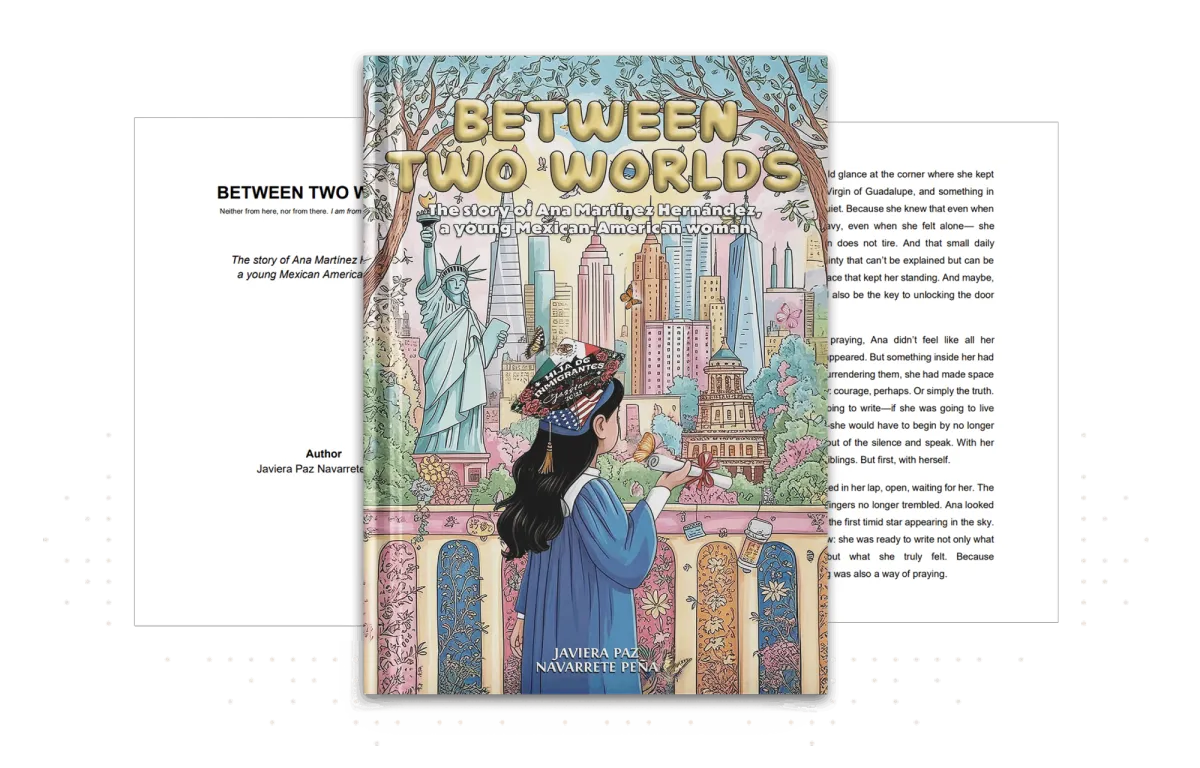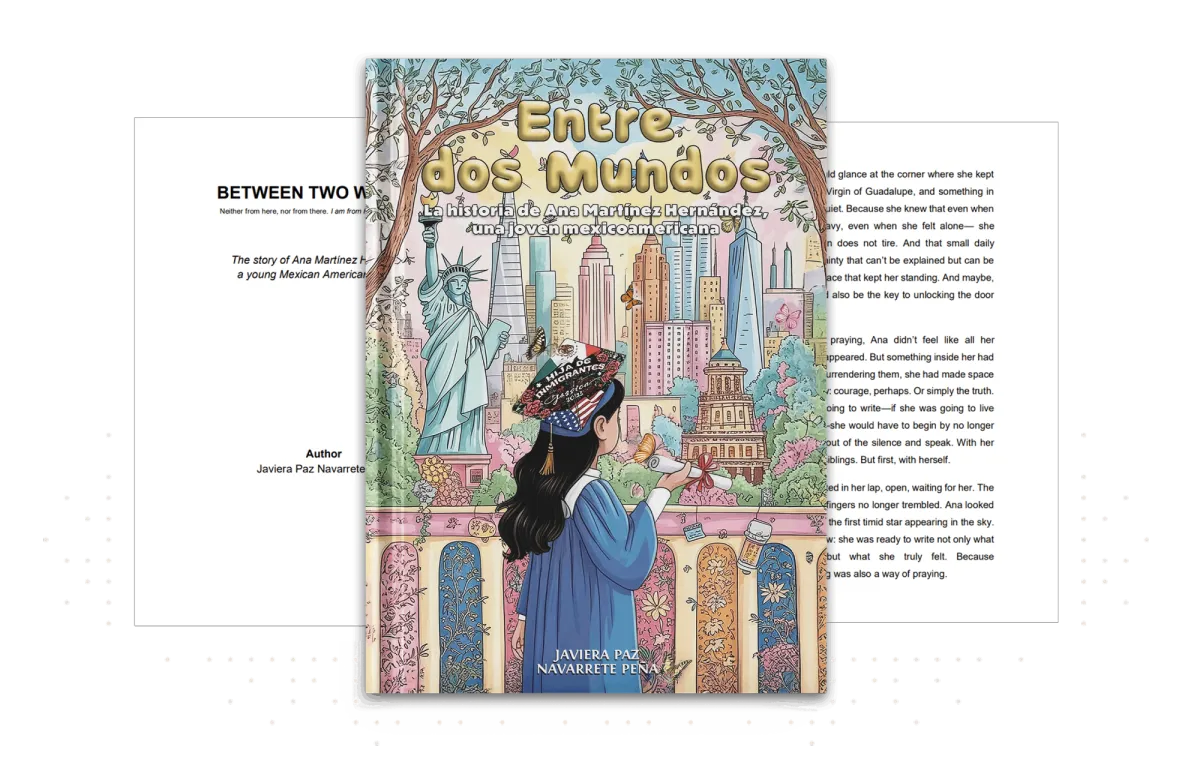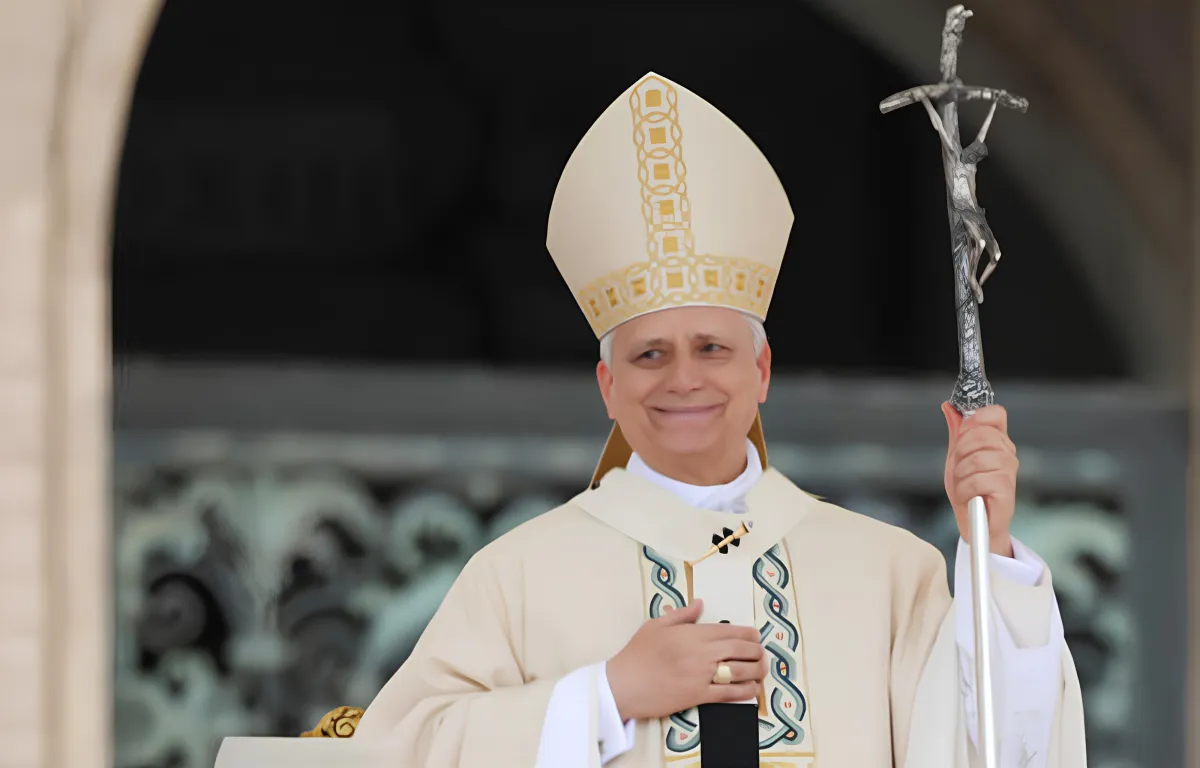
between two worlds
the story of Ana Martínez Hernández,
a young mexican-american woman

Ana Martínez Hernández’s story begins in Memphis, Tennessee, where the melodies of blues intertwine with the warmth of her Mexican roots. Born to immigrant parents who crossed borders with courage and sacrifice, Ana grows up navigating two distinct worlds — the traditions of her family and the fast-paced reality of the United States.
Through Ana’s journey, Entre Dos Mundos explores themes of identity, belonging, faith, and resilience. From her bilingual childhood and struggles with cultural expectations to her pursuit of education and passion for literature, Ana faces the challenges of being “too Mexican” for some and “too American” for others. Her story unfolds as she learns to embrace both worlds, finding strength in her heritage while forging her own path forward.
As Ana becomes a writer, her words give voice to the experiences of her community — immigrants balancing hope and hardship, children bridging generational divides, and families carrying dreams across borders. Her narrative weaves together personal growth, family bonds, and the unyielding power of faith and culture to illuminate a universal truth: our identities are not divided, but enriched, by the worlds we inhabit
Entre Dos Mundos
La historia de Ana Martínez Hernández,
una joven mexicoamericana

Ana Martínez Hernández’s story begins in Memphis, Tennessee, where the melodies of blues intertwine with the warmth of her Mexican roots. Born to immigrant parents who crossed borders with courage and sacrifice, Ana grows up navigating two distinct worlds — the traditions of her family and the fast-paced reality of the United States.
Through Ana’s journey, Entre Dos Mundos explores themes of identity, belonging, faith, and resilience. From her bilingual childhood and struggles with cultural expectations to her pursuit of education and passion for literature, Ana faces the challenges of being “too Mexican” for some and “too American” for others. Her story unfolds as she learns to embrace both worlds, finding strength in her heritage while forging her own path forward.
As Ana becomes a writer, her words give voice to the experiences of her community — immigrants balancing hope and hardship, children bridging generational divides, and families carrying dreams across borders. Her narrative weaves together personal growth, family bonds, and the unyielding power of faith and culture to illuminate a universal truth: our identities are not divided, but enriched, by the worlds we inhabit
Meet
Javiera Paz NaVaRrete Peña
Javiera Paz Navarrete Peña is a Chilean-born author, educator, and communications specialist whose work celebrates identity, culture, and the immigrant experience. Born in Santiago, Chile, in 1986, she graduated with academic honors from Universidad Gabriela Mistral, earning a Bachelor’s in Social Sciences, a degree in Journalism, and a Licentiate in Philosophy. Her passion for language and storytelling led her to continue her studies abroad at Universidad Antonio Nebrija in Spain and Università di Bologna in Italy before completing a Master of Arts in Romance Languages at the University of Memphis.
Javiera’s debut novel, Entre Dos Mundos (Between Two Worlds), is a powerful work of contemporary fiction that explores the complexities of growing up between cultures. Through the story of Ana Martínez Hernández, a young Mexican American navigating faith, family, and identity, Javiera gives voice to the immigrant journey and the challenges of balancing heritage with personal dreams.

blogs
Lorem Ipsum is simply dummy text of the printing and typesetting industry. Lorem Ipsum has been the industry's standard dummy text ever since the 1500s, when an unknown printer took a galley of type and scrambled it to make a type specimen book.

The Privilege of the Poor: Reflections on Dilexi Te by Pope Leo XIV
By Javiera Navarrete
After reading the apostolic exhortation Dilexi Te by Pope Leo XIV on the love for the poor, I was deeply moved to reflect on its central message: that the poor hold a unique place in God’s heart—not as a symbol of weakness, but as a sacred space where humanity encounters the divine.
🕊️ The Poverty of Jesus as a Message
From the very beginning of the Gospel to the moment of His passion, the life of Jesus is marked by poverty and rejection. He was born without a place at the inn, fled with His parents to Egypt, was expelled from His own synagogue, and died outside the city walls. His story—from the manger to the cross—is a story of love offered for the salvation of all.
In his first apostolic exhortation, Dilexi Te (October 4, 2025), Pope Leo XIV continues the legacy of his predecessor, Pope Francis, inviting us to rediscover the “privilege of the poor.” This is not a call to idealize suffering, but to recognize that in the vulnerability of poverty, we meet God’s heart. “The love of Christ,” the Pope writes, “urges us to be more attentive to the suffering and needs of others.”
The Meaning of the “Privilege of the Poor”
Throughout the history of the Church, this truth has endured: the poverty of Christ is a divine pedagogy that teaches humility and fraternity. The Fathers of the Church and the Popes of the twentieth century made this clear:
To see the poor as Christ Himself.
To love one’s neighbor, even to the point of personal sacrifice.
To build a social order grounded in charity and justice.
The “privilege of the poor” is not a condition of inferiority—it is a position of spiritual dignity. Those who suffer and persevere become bearers of the Gospel’s light.
🌎 From Bethlehem to the Border: A Call for Our Time
Joseph and Mary fled to another land so their child could be born in safety. They did so out of love—without “papers.” Their journey mirrors that of countless migrant families today, moved by the same instinct for life and hope, seeking refuge and protection.
The Pope reminds us that welcoming the migrant is not merely an act of philanthropy; it is a Gospel response. As a Church, we are called to:
Welcome without asking for documents.
See migration as part of the path of salvation.
Strengthen concrete works of charity that respond to exclusion both humanly and structurally.
Living Charity as Mission
In Dilexi Te, the Holy Father insists that charity is not a passing sentiment but a vital link between the Eucharist and Christian mission. To love one’s neighbor is to extend the living presence of Christ in the world.
Therefore, pastoral ministry must be centered on:
Treating others without prejudice.
Promoting tangible spaces of service and compassion.
Forming hearts that love through action, not only words.
Conclusion: Love That Becomes Shelter
The exhortation Dilexi Te reminds us that Jesus’ poverty was not a sign of lack, but a chosen way to reveal the boundless love of God. In every migrant, every displaced family, and every forgotten soul, that same Christ still seeks a place to rest.
To imitate Joseph and Mary is to trust, to protect, and to accompany. It is to believe that what is best for the poor, the suffering, and the excluded is also what most pleases God. Only then can the Church truly become a home and a refuge. Only then does love of neighbor become a living testimony of the Gospel—for in the face of the poor, the privilege of those loved first by God continues to shine.
Pope Leo XIV, in Dilexi Te, reminds us that the heart of the Church must always beat in rhythm with the suffering of the poor and the displaced. His words speak powerfully to our times, inviting us not to look away from the faces of those who arrive at our borders seeking safety and hope.
As followers of Christ, we cannot remain silent before the pain of so many migrant families. The Gospel calls us to listen, to accompany, and to defend the dignity of every person—for in each of them, we encounter the living presence of Jesus Himself.
Pope Leo’s teaching urges the Church in the United States to be a sign of mercy and courage—a community that opens its doors and its heart. To love the poor, as he reminds us, is not an option but the very measure of our faithfulness to Christ. Only through this love will the Church truly become what she is meant to be—a home for all.
reader reviews

"My life changed forever"
"Testimonial lorem ipsum dolor sit amet, consectetur adipisicing elit. Autem dolore, alias, numquam enim dolor elit."

— John Doe

"My life changed forever"
"Testimonial lorem ipsum dolor sit amet, consectetur adipisicing elit. Autem dolore, alias, numquam enim dolor elit."

— John Doe

"My life changed forever"
"Testimonial lorem ipsum dolor sit amet, consectetur adipisicing elit. Autem dolore, alias, numquam enim dolor elit."

— John Doe

"My life changed forever"
"Testimonial lorem ipsum dolor sit amet, consectetur adipisicing elit. Autem dolore, alias, numquam enim dolor elit."

— John Doe
get in touch
contact me
Thank you for stopping by. If something here has inspired you, moved you, or sparked a question, I’d love to hear from you.